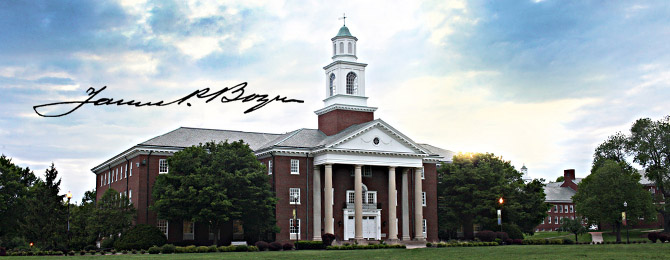ETD Copyright Information
Who owns the copyright in my thesis/dissertation/project?
You do! You are the owner of the copyright in your work from the moment it is fixed in a tangible form, including computer memory. You continue to own that copyright until you transfer it to another party. A transfer of copyright must be in writing.
Should I register my copyright with the Copyright Office?
It is not required that you register with the Copyright Office in order to enjoy copyright protection. Such protection is automatic, coming into effect at the moment original work is fixed in a tangible medium. But registration has certain advantages. First, if your work is registered you have strong evidence that you are indeed the author of the work and the owner of its copyright. Also, registration is necessary to enforce a copyright against an infringer or plagiarist. For these reasons, SBTS recommends that you register copyright of your thesis/dissertation. This can be done online directly through the Copyright Office website at www.copyright.gov for a basic fee of $35 or through ProQuest, who will register the copyright for you and in your name for a fee of $65.
What effect does the license SBTS asks me to sign when I submit my thesis/dissertation have?
Licenses are permission you give to others to use your work in ways that would otherwise not be permitted by copyright law. Licenses are permission; they are not a transfer of your copyright. SBTS requires that you give a license to the University to put your thesis/dissertation in our repository of electronic theses and dissertations and to make it available on the Internet under the terms of a Creative Commons license. This means that SBTS can distribute your work in a way that allows other scholars to read it and use it for non-commercial purposes, as long as they do not make changes to your work and always give you credit. This license is designed to enable scholarship and to protect you from plagiarism.
Since this permission that you grant to SBTS does not transfer copyright ownership, you continue to hold all of the rights in the copyright “bundle” (the exclusive rights to reproduce, distribute, display and perform your work, as well as the right to authorize derivative works). These rights will now be subject to the license given to SBTS, but nothing in the license will prevent you from transferring your copyright to some other party at a later date if you wish to do so.
Can I use copyrighted material from other people (quotations, images, etc.) in my electronic thesis/dissertation/project?
Quotations from other writers are a regular part of most scholarship and are generally consider a classic example of “fair use.” Fair use is an exception to the copyright holder’s exclusive rights. It provides an indispensable opportunity for scholarship, since so much of research involves building upon the insights of others.
There is no exact rule about how much one may quote and remain within the boundaries of fair use. Various guidelines that offer specific numbers of words or lines are advisory and do not have the force of law. In general, quotations from the work of others should be no longer than is necessary to support the scholarly point you wish to make. When you are subjecting the quoted material (or images that are reproduced) to scholarly criticism or comment, you have more leeway for fair use than in many other situations, but you should be sure that you do not use more of someone else’s work than is necessary for the argument that you are making in your own thesis/dissertation/project.
When something is fair use, permission from the copyright holder is not required. If you are using a large amount of text or images, however, and/or that material is not the subject of a specific scholarly analysis, you may want to seek permission. The library staff can help you locate the appropriate person or agency to ask.
In the case of images, you should be sure that the pictures you reproduce are closely tied to your research goals and are each made the subject of specific scholarly comment. If you use a large number of copyright-protected images by a single artist, or in some other way threaten to supersede the market for the original works, it is wise to seek permission.
More information, along with fairly conservative estimates of fair use for different media, can be found on the copyright guide provided by ProQuest at http://dissertations.umi.com/UMI_CopyrightGuide.pdf (pdf).
The content on this page was adapted with the permission of the Duke University Graduate School.
